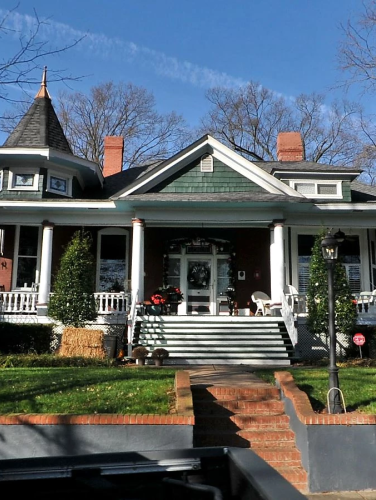
Rev. George H. Detwiler House
(ca. 1903)
The oldest remaining house on Sunnyside Avenue was once the home of Reverend George Detwiler, a well-regarded Methodist minister of local and regional prominence.
801 Sunnyside Ave., Charlotte, NC 28204
The Reverend George H. Detwiler House was the first house on Sunnyside Avenue, the best-preserved street in Piedmont Park, one of Charlotte's earliest streetcar suburbs. From 1903 to 1907, the Queen Anne style brick structure was the home of Reverend George H. Detwiler (1853-1914), a Methodist minister of local and regional significance, and his wife Mattie (1853-1920), who reportedly designed and supervised construction of the home.
Property Quick Links
Born in Findlay, Ohio, and raised in Mercer County, Illinois, Detwiler taught school in Illinois and Iowa before entering the ministry in 1877. Following his studies at the Garrett Biblical Institute in Evanston, Illinois, in 1886, Detwiler traveled as an evangelist throughout Iowa and neighboring states until 1894 when he was placed in charge of a school for mountain children in Hendersonville, North Carolina. Subsequent stints with churches in Rutherfordton and Gastonia culminated in his 1902 appointment to pastor Charlotte’s Trinity Methodist Church. Organized in 1895 and built in 1898 at the corner of South Tryon and 2nd Streets, Trinity merged with the Tryon Street Methodist Church in 1927, which eventually became the present First United Methodist Church on North Tryon. A subsequent posting in Greensboro prompted the Detwilers to sell the house in 1907 to John Elmer Dye, a traveling salesman born in Boone County, Indiana. The Dye family kept a piano in the house’s living room for their son Robert, a burgeoning talent on the keyboard. The mother of Robert’s neighborhood friend Hal Kemp would not allow young Hal to practice his horn at home, so Robert and Hal gathered a group of neighborhood boys to practice music in the Dye living room, forming the nucleus of what became the Hal Kemp Orchestra, a nationally acclaimed musical group during the Big Band era.
Meanwhile, Reverend Detwiler returned to Charlotte to pastor the Tryon Street Church, with subsequent appointments in Asheville and Nashville, Tennessee, before failing health forced his retirement to Asheville in early 1914. He passed away later that year. In a memorial service at Charlotte’s Tryon Street Church, Detwiler was lauded as a gifted orator and one of Charlotte’s ablest and most influential preachers.

